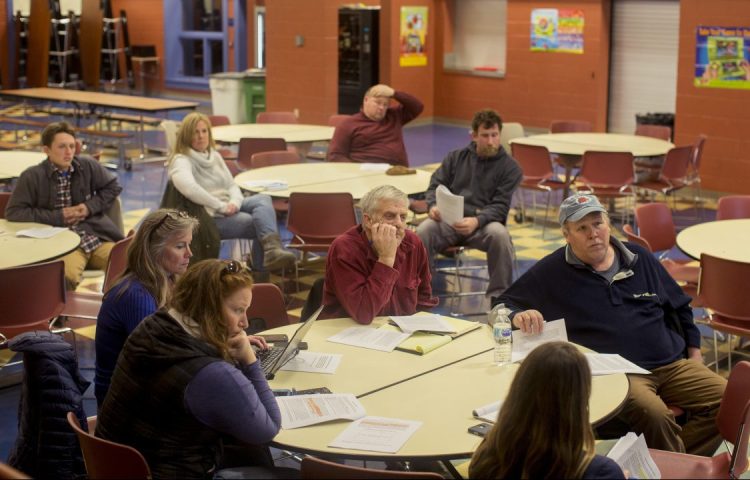SCARBOROUGH — Maine doesn’t require all of its lobstermen to share their fishing data, and they say reporting even 10 percent of the country’s largest lobster fishery is enough to give state and federal regulators statistically valid data.
That’s the argument advanced by lobstermen, the Maine Lobstermen’s Association and the state Department of Marine Resources against a proposal for 100 percent reporting, at a hearing held Wednesday by the Atlantic States Marine Fisheries Commission.
“Based on the statistics class I took, that’s 75 percent too much reporting to get relevant data,” said Jim Buxton, a Scarborough lobsterman. “It’s wasting our time. You can sit there and say, ‘Well, it’s only 10, 15 minutes a day,’ but I’ve got urchin reports, scallop reports.”
Interstate regulators want Maine to move toward 100 percent reporting, which all other states already require, to help them monitor the health of the lobster stock, know where to focus the scientific studies and understand the economic impact of the fishery.
But that reporting would cost Maine about a half-million dollars, said Patrick Keliher, state marine resources commissioner. He supports the idea of improving the quality of Maine data, not the quantity, by fair sampling of active fishermen from all license sizes in all fishing zones.
Knowing the price of 100 percent reporting would be a burden for Maine, the commission planned to seek a pledge from Maine to move to 30 percent reporting. That prompted Keliher to ask the commission scientists to evaluate the statistical validity of Maine’s 10 percent sample.
Analysis showed that 10 percent reporting in Maine results in a low co-efficient of variation, a statistical measure for precision. They compared scaled-up landings data from the sampled harvesters to dealer reports and got a 95 percent confidence interval.
“That was a game changer,” said Patrice McCarron, the director of the Maine Lobstermen’s Association. “We’re already doing what we need to do. With almost five thousand fishermen, we’re so big that a 10 percent sample is giving us what we need to know.”
That is why the Maine Lobstermen’s Association board voted Tuesday to support a proposal to optimize the 10 percent sampling already conducted by Maine, McCarron said. The group supports the collection of good data, she said, but it’s nothing Maine’s not already doing.
A few of the half-dozen lobstermen who came out to the hearing in Scarborough were wary of the commission’s data request. Buxton recalled meetings with scientists a decade ago who forecast collapse of the Maine lobster fishery, only to be followed by years of record abundance.
But Keliher said that situation proved how important data collection can be. Maine asked for data proving that forecast then, which resulted in scientific proof the stock was not dropping, Keliher recalled. As a result, his counterparts in southern New England didn’t call for a trap reduction.
That lobster fishery is almost gone now. Officials there waited years too long to take steps to preserve that stock, and now it’s probably too late to fully recover, he said. Buxton wondered, however, if management measures alone could have staved off that environmental disaster.
“Maybe not, but I don’t want to go the southern New England lobster road,” Keliher said.
The Atlantic States Marine Fisheries Commission proposal had triggered alarm among lobstermen who loathe the idea of sharing hard-earned fishing secrets with anyone. They worry regulators will use the data in setting a lobster fishing quota or introducing gear restrictions in right whale habitats.
The commission will hold a second and final Maine hearing on the proposal in Ellsworth Thursday night. The commission will accept written public comment until Jan, 22, and take up the proposal at its February meeting.
Penelope Overton can be contacted at 791-6463 or at:
poverton@pressherald.com
Twitter: PLOvertonPPH
Send questions/comments to the editors.


